Mayor Nadine Woodward, Catholic Charities announce plan to relocate House of Charity out of downtown Spokane

Catholic Charities of Eastern Washington plans to relocate the House of Charity shelter to a new location several miles outside downtown Spokane.
Mayor Nadine Woodward announced the endeavor Wednesday during her State of the City address. Dubbed “House of Charity 2.0,” the project would move House of Charity to a larger, 40,000-to-50,000-square-foot site.
The move will allow Catholic Charities to grow House of Charity from an approximately 135-bed shelter with services for men and women to one potentially capable of serving 250 to 300 individuals.
“The vision is to significantly increase space for women, provide comprehensive services that will help people become more stable and move into permanent supportive housing and offer even greater flexibility with how we give everyone a fresh start toward making Spokane a model for how we support the individual journey,” Woodward said.
The new campus would provide 24/7 low-barrier shelter services, with Catholic Charities touting access to mental health counseling and care, substance abuse counseling, medical respite, permanent housing services, vocational training, case management and peer support counseling. “Low-barrier” is an industry term for shelters that don’t have conditions like sobriety for their guests.
“The reality for us is we want to be able to do more for the homeless. More services. A better path to housing,” said Robert McCann, CEO and president of Catholic Charities of Eastern Washington. “And we know the House of Charity is just not going to work in its current location in trying to serve the entire homeless population.”
McCann said the organization has three possible sites in mind for the location of House of Charity 2.0.
He declined to specify those locations, saying the organization still has to go through processes with the city as well as listening sessions with potential future neighbors. McCann estimated an announcement could come in around a month or so.
“The best place to build a homeless shelter, folks, is ‘somewhere else,’ ” McCann said. “Everybody knows it. It’s a reality, and so we’re going to have to talk to people to get them OK with what’s coming.”
McCann estimated the project could cost anywhere from $11 million to $13 million to get up and running. He said he expects construction to take around a year once it starts.
“We hope that we will use best practice, but keep in mind here a 300-bed shelter is not necessarily best practice,” he said. “The smart thing to do would be to build six 50-bed shelters in areas in and around downtown close to services, but we live in a reality where that is not going to happen.
“We can barely site one shelter in this community,” he continued. “We’re not going to site six.”
The city will aid the Catholic Charities project by helping to find state funding and operational support, Woodward said.
Once the relocation takes place, the current House of Charity will be used for offices and support services for Catholic Charities.
The location would not continue to sleep and feed individuals on a regular basis. However, the upstairs sleeping space will remain intact for the city’s or county’s use in case of inclement weather, smoke conditions, quarantine space or other uses, according to Catholic Charities.
The decision not to house anyone on a daily basis in that facility was “a collaborative move,” McCann said, with the city and the downtown business owners “who don’t want to see the House of Charity downtown.”
“We are realizing that neighborhood with all of the housing we’ve built there, which is great news, does attract a criminal element, which then prey on those people in those apartments,” McCann said. “We want to try and take some of the density out of that neighborhood.”
House of Charity 2.0 is unrelated to the city’s efforts to locate a new low-barrier homeless shelter on East Trent Avenue. Likewise, Catholic Charities is not applying to operate the Trent Avenue site, the organization announced in a press release.
The city is looking at the East Trent Avenue property as the site of a new a 250-bed homeless shelter. Actions taken by the city to address homelessness have been heavily scrutinized, particularly in the last several months with the emergence of the Camp Hope homeless encampment on East Second Avenue.
House of Charity 2.0 was one of the programs on homelessness Woodward talked about during her State of the City address.
“Homeless Plan 2.0,” touted as an extension of initiatives she announced in July 2020, outlines an approach to these issues centered on eight focus areas, including creating additional emergency housing stock and providing individualized services.
Woodward said the plan was designed out of feedback from providers, nonprofits, private industry and government representatives, notably former Gov. Christine Gregoire, CEO of Challenge Seattle.
“Let me be very clear about one thing: This plan is a chapter,” she said. “It is not the end of a book.”